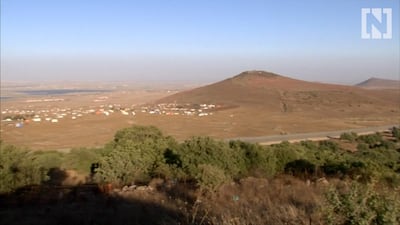The Golan Heights is one of the most prized pieces of land in the Middle East and it has been that way for millennia. It officially belongs to Syria, but Israel has occupied it since the 1967 Arab-Israeli war, a seizure considered illegal under international law.
Its location at the confluence of Syria, Israel, Lebanon and Jordan makes it a natural flashpoint but it is the area's elevation that makes it so sought after.
The rocky plateau has an average elevation of 1,000 metres. Mount Hermon, its highest point, towers 2,800 metres over the surrounding area. Whoever controls the Golan has a serious tactical advantage.
It is also home to important water sources like the Sea of Galilee and the source of the Jordan River.
Prior to 1967, more than 140,000 Syrians lived in the Golan. Today, they number just 20,000 and are forced to essentially live in Israel.
After the 1973 Arab-Israeli war, the United Nations put in place an 80-kilometre-long buffer zone to help ensure Israeli and Syrian troops do not come in to conflict.
For much of the last 40 years, that zone has worked. But since the start of the Syrian civil war in 2011, that has changed as the frontier's border has become more insecure. Various rebel groups including ISIS have controlled parts of the border area. As the Assad regime, with help from Iranian-backed fighters, has started to target these groups and recapture parts of the area, Israel is on high alert.
______________
Golan Heights
Israel shoots down Syrian jet near Golan Heights
Syrian regime forces close in on area near Israeli-annexed Golan Heights
Israel to Russia: Assad's safe from us, but Iran must quit Syria
______________
Israel has undertaken dozens of military operations over the border, hitting weapons caches and conveys it says are putting Iranian weapons into the hands of militias allied with Tehran. It says it does not want an escalation, but has warned that it will counter any threat.
As the regime solidifies control of the area and Iranian-backed fighters draw closer to Israel, many worry the Golan could once again descend into violence.


